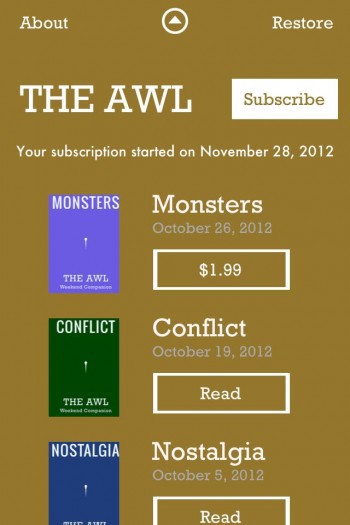Please Welcome "The Awl's Weekend Companion," for iPad and iPhone

There’s a whole bunch of ways to read now, and we’d like you to indulge in all of them, as you wish, even in the ways that don’t particularly help us publish writing. One thing we’ve often heard from folks is that they would like a quiet thing to sit down with for reading — away from the laptop and the desktop, away from the IMs and Twitter and email and noise.
With the help of 29th Street Publishing, we’ve made The Weekend Companion. It’s a weekly Awl magazine, and it comes out every Friday, for iPhone and iPad, through Apple’s Newsstand. Each issue has just five or so substantial things to read from the week. And a wee intro, and that’s it. Unlike lots of the web, it’s pretty, deluxe, fun and it’s also easy. Plus, the great joy of a web magazine is that it comes to you.

We’d love it most of all if you checked it out and actually wanted to subscribe for a month or for a year. It costs all of $4 a month. (There’s another free month if you share your info with us, too!) But you can also download it for free and check out three free recent issues. And if you wish, you can buy issues one by one. So go on.
While you do that, we wanted to talk a little bit, should you be interested, about this in a more meta sense.
Apps aren’t for everyone. (Haha, obviously.) We want this to serve a group of readers for whom this is ideal. They — you?! — would like to support writing and publishing, and also enjoy a particular kind of reading, reading that’s a little more luxurious in format and in manner.
Also they must own iPads or iPhones, right? What was that Marx said about “the means of consumption”? (What’s that you say?)
Anyway. Right now, much of the way the web is made, particularly at places designed for reading, is becoming a bit more “app-like,” as we think of that now. That’ll increase, and it’s good. Overall, things are getting less ugly! Even our famously unattractive website will be heading that direction… somewhat.
And at the same time, app-making is becoming more democratic. 29th Street’s goal is that selling subscriptions on iTunes should be “as simple as blogging.” Perhaps you remember when blogging was not so simple! It only became so because people built tools that made it so.
Right now apps are currently way out of vogue. People like, spit on the ground when someone says “apps.” (I mean, pretty literally, I saw some web publishers do this at a panel recently.) And for good reason! A bunch of big companies went crazy about apps, and spent a lot of money making them. They did not, many of us were un-shocked to find, get a “return on their investment.” They were doing it wrong. And they probably shouldn’t have done it in the first place! Or they should have, but for fun!
Democratizing app production, however, makes apps scale. And also subscription products — whether it’s an app, or newsletters and emails, or books, or physical objects — help small business and independent purveyors succeed. So now a smart company has built the infrastructure as a product for companies without that big expensive backbone, thereby eliminating the need for insane burn rates, fleets of designers and catered conference room lunches. (Who is going to democratize catered conference room lunches? That is what we are waiting for.)
Recently I visited with a publisher of a pay reading product. He was acting mock-furious with us — though he clearly really disagreed with our choices — for “giving things away for free on the web.” It was kind of funny but it was also so alien to me. (He also had a much nicer office than our sad/adorable little hobbit-hole.) We want people to be able to read things for free! On one very real level, if every reading product cost money, well, many of us wouldn’t get to do very much reading then, would we? And from our point of view, I didn’t understand really why he was holding all that writing hostage.
And yes, “reading for free” serves the advertising model, which is usually going to be imperfect. We — along with everyone else! — have not solved the problem of the finances of writing online. (Though the ways that advertising works online in general are, in many ways, drastically improving. For instance, some brands whose goal used to be “make banners that people will click on” now sometimes have the goal of “getting credit for being the underwriter of great editorial content.”)
It’s incredibly important right now for publishers whose income largely derives from advertising to, well, we hate to use a business school word like “diversify,” but, yeah: diversify. At the same time, subscription products give readers a chance to be, essentially, members. (This is referred to, usually derisively, as “the NPR totebag business model.”) Of course we’d love it if you wanted to join up. Maybe we can invent a secret handshake or something. And if not, that’s cool too. We think people reading for free on the web are absolutely just as valuable as those who want to pay a wee bit of money for reading in a very handsome iPad app. You do you. We can dig it.
